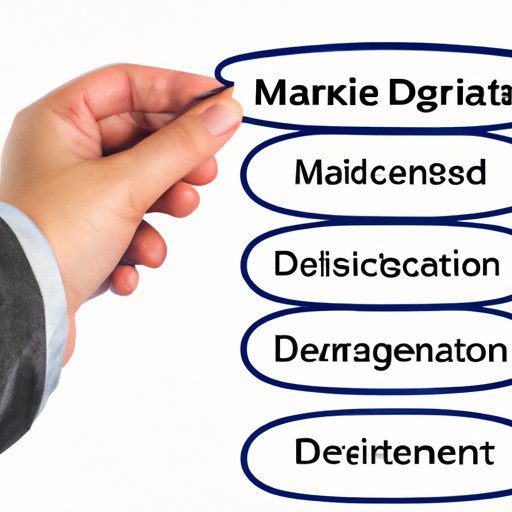
I. Introduction
Marketing is a crucial aspect of any business, and the role of a marketing director is vital in ensuring that a business succeeds. Marketing directors are responsible for creating and executing strategies that help businesses reach their goals, such as increasing sales, expanding into new markets, or creating brand awareness. In this article, we will explore what a marketing director does, the essential skills and qualifications required for the role, how they drive business growth, and customer relationship management.
II. A Day in the Life of a Marketing Director: What Are the Responsibilities?
A marketing director has a varied and dynamic day-to-day role that requires them to be strategic, organized, and creative. Responsibilities vary depending on the industry, company size, and marketing strategies they are working on. Generally, the following duties fall under the scope of a marketing director:
- Developing and implementing marketing plans for new and existing products or services.
- Analyzing market data and trends to identify opportunities and threats.
- Collaborating with other departments to ensure brand consistency and optimal customer experiences.
- Managing budgets and resources for marketing campaigns.
- Overseeing promotional activities and ensuring that they align with the company’s goals.
- Staying up-to-date with the latest trends and technologies in the marketing industry.
Marketing directors need to have a comprehensive understanding of their target audience, market trends, and competitive landscape to develop and implement effective marketing campaigns.
III. Essential Skills and Qualifications Required for Becoming a Successful Marketing Director
Becoming a successful marketing director requires a specific set of skills and qualifications that include:
- Strong communication skills
- Excellent analytical and problem-solving abilities
- Proficiency in digital marketing channels and technologies
- Experience in managing teams and projects
- A Bachelor’s or Master’s degree in Marketing, Advertising, Business, or a related field
- Experience working in a marketing-related role
Marketing directors need to have a working knowledge of other business-related functions such as finance, operations, and sales. They need to know how these functions affect marketing strategies and how they can collaborate with colleagues in other departments to achieve the company’s goals.
IV. How Marketing Directors Drive Business Growth: Strategies and Execution
Marketing directors play a pivotal role in driving business growth by developing and executing marketing strategies that align with the company’s goals and values. Here are some of the most common marketing strategies they use:
- Market Segmentation: Identifying distinct groups of consumers and targeting them with customized messages and products.
- Product Positioning: Differentiating the company’s products and services from its competitors.
- Promotional Campaigns: Developing and executing campaigns that raise brand awareness and promote products or services.
- Content Marketing: Creating and distributing valuable and relevant content to attract and retain customers.
- Social Media Marketing: Using social media to engage with customers, increase brand awareness, and promote products.
Successful marketing directors have an ability to think creatively and analytically to create impactful marketing strategies. To achieve business growth, marketing directors have to anticipate customer needs, track and measure campaign performance, and adapt quickly to changes in the market.
V. Behind the Scenes: Insights from Marketing Directors about their Role in Business Success
Marketing directors have a unique perspective on their role in business success. To get insights from the people who best understand this role, we interviewed a few marketing directors. They shared their experiences, challenges, and lessons learned about working as a marketing director. The following are their insights:
- “A marketing director has to make sure that every action they take aligns with the company’s vision and values. They must be able to stay agile and quickly adapt to changes in the market while keeping customers at the forefront of their decisions.” – Marketing Director at a Software Company.
- “The most challenging aspect of being a marketing director is balancing creativity with data analytics. We have to be creative enough to develop innovative campaigns, but we also need to use data to track campaign performance and make informed decisions.” – Marketing Director at a Consumer Goods Company.
- “Marketing directors play a crucial role in shaping a company’s brand image. It requires collaboration with other departments and an ability to understand the target audience’s needs and values.” – Marketing Director at a Healthcare Company.
Marketing directors need to stay open to learning and to keep their skills and knowledge up-to-date. With the marketing landscape constantly evolving, they must understand how new technologies and trends can be implemented to drive business growth.
VI. What Clients Want: An Inside Look at the Relationship Between Marketing Directors and their Clients
Marketing directors have a professional relationship with clients that goes beyond selling products and services. Clients expect expertise, creativity, and transparency from marketing directors. Building and maintaining a positive client-business relationship requires marketing directors to:
- Understand the client’s business, industry, and competitors
- Listen to the client’s needs, feedback, and concerns
- Provide clear and honest communication about their marketing strategies and execution
- Deliver high-quality results within the agreed-upon timeframe and budget
- Build trust and rapport with clients
A positive client-business relationship is beneficial for both parties. It creates a more productive and efficient working environment that fosters creativity, innovation, and a shared understanding of business goals and objectives.
VII. Conclusion
Marketing directors play a critical role in a company’s success. They are responsible for driving business growth by developing and executing marketing strategies that attract, retain and engage customers. To thrive in this role, marketing directors must have a specific set of skills, and knowledge and must stay up-to-date with the latest trends and technologies in their industry. Building and maintaining positive relationships with clients is also crucial for success.
A competent marketing director is strategic, organized, creative, and has a strong understanding of business concepts. In conclusion, being a successful marketing director requires a combination of work experience, interpersonal skills, and knowledge- all tightly aligned with the business objectives and goals.





